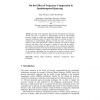Free Online Productivity Tools
i2Speak
i2Symbol
i2OCR
iTex2Img
iWeb2Print
iWeb2Shot
i2Type
iPdf2Split
iPdf2Merge
i2Bopomofo
i2Arabic
i2Style
i2Image
i2PDF
iLatex2Rtf
Sci2ools
147
click to vote
ADBIS
2007
Springer
2007
Springer
On the Effect of Trajectory Compression in Spatiotemporal Querying
Existing work repeatedly addresses that the ubiquitous positioning devices will start to generate an unprecedented stream of time-stamped positions leading to storage and computation challenges. Hence the need for trajectory compression arises. The goal of this paper is to estimate the effect of compression in spatiotemporal querying; towards this goal, we present an analysis of this effect and provide a model to estimate it in terms of average false hits per query. Then, we propose a method to deal with the model's calculation, by incorporating it in the execution of the compression algorithm. Our experimental study shows that this proposal introduces a small overhead in the execution of trajectory compression algorithms, and also verifies the results of the analysis, confirming that our model can be used to provide a good estimation of the effect of trajectory compression in spatiotemporal querying.
ADBIS 2007 | Compression Algorithms | Database | Trajectory Compression | Trajectory Compression Arises |
Related Content
| Added | 12 Aug 2010 |
| Updated | 12 Aug 2010 |
| Type | Conference |
| Year | 2007 |
| Where | ADBIS |
| Authors | Elias Frentzos, Yannis Theodoridis |
Comments (0)

